复习Unit2.2八年级英语下册第二单元复习第二课时
八年级英语下册教案:Unit 2 I’ll help to clean up the city
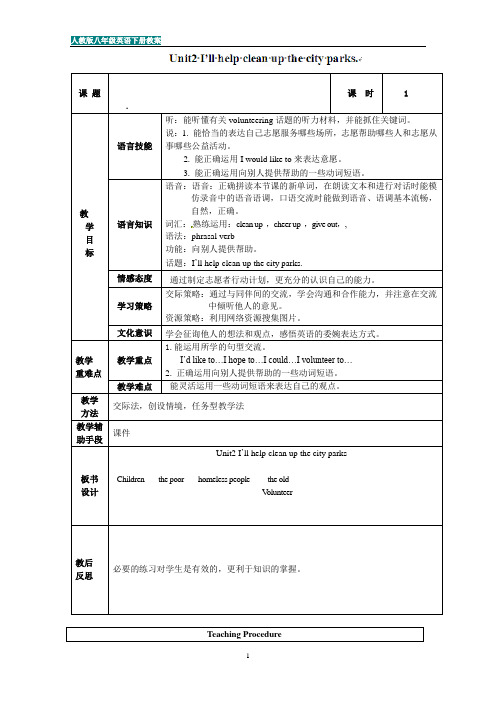
课题.课时 1教学目标语言技能听:能听懂有关volunteering话题的听力材料,并能抓住关键词。
说:1. 能恰当的表达自己志愿服务哪些场所,志愿帮助哪些人和志愿从事哪些公益活动。
2. 能正确运用I would like to来表达意愿。
3. 能正确运用向别人提供帮助的一些动词短语。
语言知识语音:语音:正确拼读本节课的新单词,在朗读文本和进行对话时能模仿录音中的语音语调,口语交流时能做到语音、语调基本流畅,自然,正确。
词汇:熟练运用:clean up ,cheer up ,give out,,语法:phrasal verb功能:向别人提供帮助。
话题:I’ll help clean up the city parks.情感态度通过制定志愿者行动计划,更充分的认识自己的能力。
学习策略交际策略:通过与同伴间的交流,学会沟通和合作能力,并注意在交流中倾听他人的意见。
资源策略:利用网络资源搜集图片。
文化意识学会征询他人的想法和观点,感悟英语的委婉表达方式。
教学重难点教学重点1.能运用所学的句型交流。
I’d like to…I hope to…I could…I volunteer to…2. 正确运用向别人提供帮助的一些动词短语。
教学难点能灵活运用一些动词短语来表达自己的观点。
教学方法交际法,创设情境,任务型教学法教学辅助手段课件板书设计Unit2 I’ll help clean up the city parksChildren the poor homeless people the oldV olunteer教后反思必要的练习对学生是有效的,更利于知识的掌握。
Teaching ProcedureStages/TimingTeachet ers’ activities Students’ activities MethodologyStep 1 Warming upStep 2 lead-inStep 3 practice T: Could you please help me close thedoor?Could you please help me open thewindow?Thanks for your help.Do you know there is a special day inDecember. On that day, many peoplewo uld like to help others who need help.Do you know when is it and what day is itthat day?Introduction of “International V olunteerDay”Time: December 5th.They give people help without hope ofrewardLet’s enjoy some pictures.Show some pictures.They help to sent food to the poor people.They help to examine the health conditionof the old.They help to cut the hair of the poor.They help to clean the yards of thecommunity.They help to clean the bus-stop.What else could we do to help people?Show some other pictures.I’d like to/I hope to/I could/I volunteerto:help children with their schoolwork.visit the old in an old people’s home.help watch the traffic.give our old boo ks to “Hope School”.cheer up sick kids in the hospital.…1a. Look at the ways y ou could helppeople in thepicture. Then list other ways.Other ways you could help people___________________________________________________________________________________________________Ss do it.Ss think about it.Ss: They help to sentfood to the poorpeople.They help toexamine the healthcondition of the old.They help to cut thehair of the poor.They help to cleanthe yards of thecommunity.They help to cleanthe bus-stop.What else could wedo to help people?Ss: I’d like to/Ihope to/I could/Ivol unteer to:Ss do 1a.复习,进一步巩固落实。
八下英语第二单元知识点归纳

八下英语第二单元知识点归纳In the second unit of the eighth grade English textbook, students are introduced to a variety of knowledge pointsthat are essential for their language learning and understanding. One of the key knowledge points is the useof the past continuous tense, which is a fundamental aspect of English grammar. This tense is used to describe actions that were ongoing in the past at a specific point in time, and it is important for students to understand how to form and use this tense correctly in order to communicate effectively in English.Another important knowledge point in this unit is the use of adjectives to describe people and things. Adjectives are essential for adding detail and depth to descriptions, and students are taught how to use them effectively to convey specific qualities and characteristics. Understanding how to use adjectives correctly is crucialfor students to be able to express themselves clearly and accurately in English.Additionally, students are introduced to the concept of direct and indirect speech in this unit. Direct speech involves quoting the exact words spoken by someone, while indirect speech involves reporting what someone saidwithout quoting their exact words. This distinction is important for students to understand, as it affects howthey convey information and communicate in different contexts.Furthermore, students learn about the use of modalverbs in this unit. Modal verbs are used to express necessity, possibility, ability, permission, and obligation, and they play a crucial role in conveying different meanings and nuances in English. It is important for students to understand how to use modal verbs correctly in order to communicate effectively and accurately in various situations.Moreover, students are taught about the use of prepositions in this unit. Prepositions are words that show the relationship between a noun or pronoun and other wordsin a sentence, and they are essential for indicating location, time, and direction. Understanding how to use prepositions correctly is crucial for students to be able to construct meaningful and coherent sentences in English.Lastly, students are introduced to the concept of reported speech in this unit. Reported speech involves reporting what someone else has said, and it is important for students to understand how to change the tense, pronouns, and other words when converting direct speech into reported speech. This knowledge is essential for students to be able to accurately convey information and communicate effectively in English.In conclusion, the second unit of the eighth grade English textbook covers a wide range of knowledge points that are essential for students to master in order to develop their language skills. From understanding the past continuous tense to using adjectives, modal verbs, prepositions, and reported speech, students are equipped with the fundamental tools they need to communicate effectively and accurately in English. Mastering theseknowledge points is crucial for students to be able to express themselves clearly and confidently in both spoken and written English.。
第二课时外研版英语八年级下册Module7Unit2教学设计
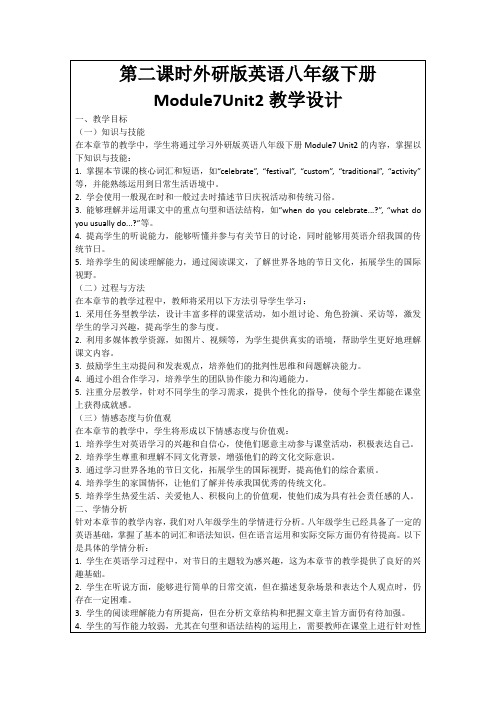
7.教学中注重情感教育,引导学生尊重和理解不同文化背景,培养他们的跨文化交际意识。
8.结合教材内容,适时融入德育教育,培养学生热爱生活、关爱他人、积极向上的价值观。
3.阅读作业:阅读一篇关于世界各地节日的英文文章,完成相关练习,如填空、判断正误、回答问题等。要求学生在阅读过程中,注重文章结构和主旨大意的把握,提高阅读理解能力。
4.听力作业:听一段关于节日庆祝活动的英语对话,完成相关练习。培养学生关注细节、获取关键信息的听力技巧。
5.课后实践活动:了解并收集我国一个传统节日的资料,包括节日的起源、习俗、活动等,以PPT或手抄报的形式呈现。在下一节课上,与同学们分享你的成果,增进对传统文化的了解和传承。
2.俗。
3.能够理解并运用课文中的重点句型和语法结构,如“when do you celebrate...?”, “what do you usually do...?”等。
4.提高学生的听说能力,能够听懂并参与有关节日的讨论,同时能够用英语介绍我国的传统节日。
3.针对写作难点,设计梯度性的写作任务,让学生从仿写、改写等简单任务逐步过渡到独立创作。在写作过程中,教师给予针对性的指导,帮助学生运用所学知识,提高写作能力。
4.利用课堂小组合作学习,促进学生之间的互动交流,培养学生的团队协作能力和语言表达能力。
5.教学过程中,关注学生的个体差异,实施分层教学。针对不同学生的学习需求,提供个性化的指导,使每个学生都能在课堂上获得成就感。
四、教学内容与过程
(一)导入新课
1.教师通过展示世界各国庆祝节日的图片和视频,引导学生关注不同文化背景下的节日庆典,激发学生对本节课的兴趣。
Module+12+Unit+2第二课时课件 外研版八年级英语上册
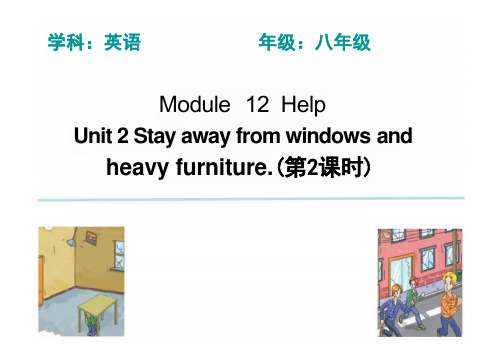
2.警告某人某事
3.during an earthquake
3.在地震期间
4.jump out of high buildings 4.从高楼跳出去
5.hide under a table
5.藏在桌子下面
6.stay away from 7.keep clear of fires
6.远离 7.不接触火
警告;告诫v.
earthquake
Warn
/'IN:saId/ /'ʌndə/
在里面;向室内 adv. inside
在……里面 prep.
里面的;内部的adj.
在 … … 正下方; prep. under 在….…下面
/ki:p/
保持;留在 v.
keep
/'wIndəu/
/klio/
/ka:m/
/breIV/ /'helpfl/ /'pavə /
hotel warned me aboutthe weather.
Language points
warn sb.to do sth.意为“警告某人去做某事”; warn sb.not to dosth.意为“警告某人不要做某事”。
如:
老师经常告诫我们车辆拥挤的路上要当心。
The teacher often warns US to be careful in heavy traffic.
In short,follow what you learnt in school.You can be safe and you can also help save others.
Try to remember them.
1.it's difficult to do sth
2020年春牛津译林版英语八年级下册— Unit2知识点梳理

Unit 2 Travelling2.1 Comic strip & Welcome to the unit1. fantasticadj.意为“极好的,美妙的”。
have a fantastic time=have a good/great/wonderful time玩得开心。
fantasy n.幻想,想象。
2. such det.& pron.such意为“这样的(人或物)”,常用于以下结构:such+a/an+adj.+可数名词单数。
如:This is such a big house.这是一座如此大的房子。
such+adj.+可数名词复数。
如:They are such kind girls.她们是如此好心的女孩。
such+adj.+不可数名词。
如:It is such sad music.它是如此悲伤的音乐。
【辨析】so常用于以下结构:so+adj.+a/an+可数名词单数。
如:so clever a boy如此聪明的一个男孩so+adj./adv.。
如:so clever如此聪明;so quickly如此迅速so many/much/few/little+n.。
如:so many mistakes如此多的错误3. couple n.意为“两人,两件事物,几个人”。
a couple of…一对,几个,几件。
I saw a couple of men get out我看见有两个男人出去了。
We went there a couple of years ago.我们几年前去过那儿。
4. --- Hey, Eddie.Where are you going? 嘿,埃迪。
你要去哪儿?---I'm going to South Hill for my holiday.我要去南山度假。
这两句都表示将要做某事,一般用将来时态,但因为句中的动词是go,所以可用现在进行时表示将来的概念。
8年级下册英语导学案Unit2

学校:班级:小组:姓名:小组评价:教师评价:Unit 2 I’ll help to clean up the city parks.第一课时 Section A(1a-1c)【学习目标】1.会使用重点单词cheer,volunteer...,重点短语clean up,cheer up,give out...2.会使用“I could...”、“I hope to...”等句型,向别人提供协助。
3.能听懂、能说出“协助他人,参加社会公益活动”的相关话题。
【学习重难点】1.掌握cheer,volunteer...,clean up,cheer up,give out...的用法。
2.用重要句型向别人提供协助。
【学法指导】1.查词汇表,自学本课时新词汇。
2.朗读1b,勾画有用的表达:clean up,cheer up,give out,at the food bank3.互助学习,练习对话。
【自学互助】一.温故知新:和同伴议一议,讨论回答以下问题。
1.Do you think helping other is great?2.What will you do if you are a volunteer? Please give some examples.二.翻译以下短语。
1.清扫__________2.分发___________3.使快乐;振奋____________________4.sick children________________5.at the food bank__________________6.after-school study program______________________三.通过互助学习后,我的疑惑是_____________________________________________________________________________ 【展示互导】看图说,仔细听,认真评通过观察1a图片中你能够协助人们的方式,然后列出更多其他方式。
八年级英语下册电子课本
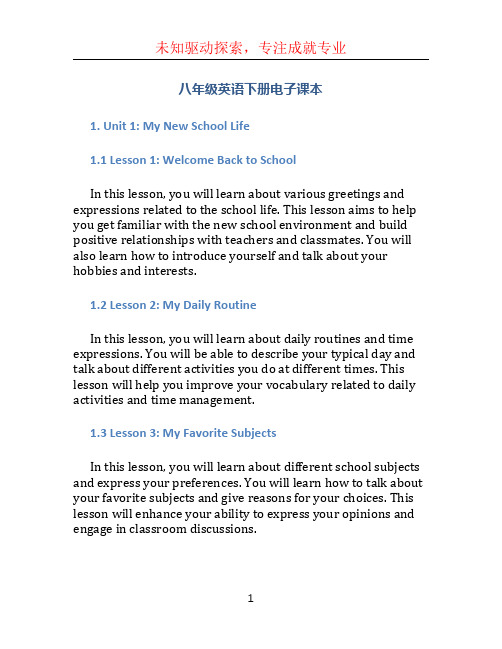
八年级英语下册电子课本1. Unit 1: My New School Life1.1 Lesson 1: Welcome Back to SchoolIn this lesson, you will learn about various greetings and expressions related to the school life. This lesson aims to help you get familiar with the new school environment and build positive relationships with teachers and classmates. You will also learn how to introduce yourself and talk about your hobbies and interests.1.2 Lesson 2: My Daily RoutineIn this lesson, you will learn about daily routines and time expressions. You will be able to describe your typical day and talk about different activities you do at different times. This lesson will help you improve your vocabulary related to daily activities and time management.1.3 Lesson 3: My Favorite SubjectsIn this lesson, you will learn about different school subjects and express your preferences. You will learn how to talk about your favorite subjects and give reasons for your choices. This lesson will enhance your ability to express your opinions and engage in classroom discussions.2. Unit 2: Healthy Habits2.1 Lesson 1: Eating RightIn this lesson, you will learn about healthy eating habits and the importance of a balanced diet. You will learn about different food groups and their nutritional value. This lesson aims to promote a healthy lifestyle and help you make better food choices.2.2 Lesson 2: Staying ActiveIn this lesson, you will learn about the benefits of regular physical activity and different ways to stay active. You will also learn about different sports and recreational activities. This lesson intends to encourage you to engage in regular exercise and lead an active life.2.3 Lesson 3: Mental Well-beingIn this lesson, you will learn about the importance of mental well-being and various strategies to maintain a healthy mind. You will learn about stress management techniques and the significance of relaxation and mindfulness. This lesson aims to promote holistic health and well-being.3. Unit 3: Travel and Adventure3.1 Lesson 1: Experiencing CulturesIn this lesson, you will learn about different cultures and the importance of respecting cultural diversity. You will learnabout customs, traditions, and cuisines of different countries. This lesson aims to broaden your horizons and promote cultural sensitivity.3.2 Lesson 2: Planning a TripIn this lesson, you will learn about the process of planning a trip and different aspects to consider, such as transportation, accommodation, and itinerary. You will also learn how to ask for and give directions. This lesson intends to develop your problem-solving and decision-making skills.3.3 Lesson 3: Outdoor AdventuresIn this lesson, you will learn about different outdoor activities and adventures. You will learn about camping, hiking, and other recreational activities. This lesson aims to promote an appreciation for nature and develop your teamwork and leadership skills.4. Unit 4: Technology and the Future4.1 Lesson 1: Technological AdvancementsIn this lesson, you will learn about technological advancements and their impact on society and daily life. You will learn about different gadgets and devices and how they have revolutionized various industries. This lesson aims to develop your technological literacy and critical thinking skills.4.2 Lesson 2: Social Media and CommunicationIn this lesson, you will learn about different social media platforms and their role in communication. You will learn about the pros and cons of social media and how to use it responsibly. This lesson intends to enhance your digital citizenship and online safety awareness.4.3 Lesson 3: The Future of WorkIn this lesson, you will learn about the future of work and how it is changing due to technological advancements. You will learn about different careers and skills that will be in demand in the future. This lesson aims to prepare you for the changing job market and develop your career planning skills.This is just a sample outline for the eighth-grade English textbook for the second semester. Each lesson can be further expanded with additional content, such as vocabulary exercises, reading passages, listening activities, and grammar practice. The textbook should also include interactive elements, such as videos, online resources, and quizzes, to engage students and enhance their learning experience.。
八年级下册英语第2单元笔记
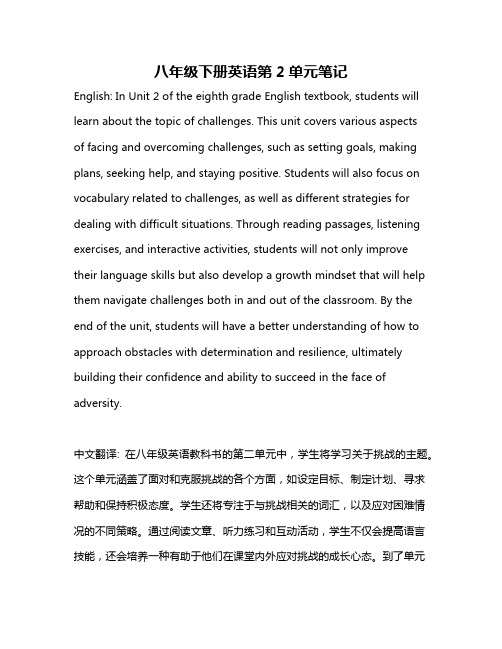
八年级下册英语第2单元笔记English: In Unit 2 of the eighth grade English textbook, students will learn about the topic of challenges. This unit covers various aspectsof facing and overcoming challenges, such as setting goals, making plans, seeking help, and staying positive. Students will also focus on vocabulary related to challenges, as well as different strategies for dealing with difficult situations. Through reading passages, listening exercises, and interactive activities, students will not only improve their language skills but also develop a growth mindset that will help them navigate challenges both in and out of the classroom. By the end of the unit, students will have a better understanding of how to approach obstacles with determination and resilience, ultimately building their confidence and ability to succeed in the face of adversity.中文翻译: 在八年级英语教科书的第二单元中,学生将学习关于挑战的主题。
- 1、下载文档前请自行甄别文档内容的完整性,平台不提供额外的编辑、内容补充、找答案等附加服务。
- 2、"仅部分预览"的文档,不可在线预览部分如存在完整性等问题,可反馈申请退款(可完整预览的文档不适用该条件!)。
- 3、如文档侵犯您的权益,请联系客服反馈,我们会尽快为您处理(人工客服工作时间:9:00-18:30)。
6. 当她看到孩子们脸上愉快的表情时,他得到一种强烈的满足感。 She got a strong ________ _________ ________ when she saw the________ _______ _______ on the children’s faces. 7 你可以跟他谈谈,帮他走出目前的困境。 You can _________ him by ________ with him.
学
活
动
课前、课 中反思
I V. 选择所给短语填空
hand out, put off, call up, come up with, put up 2. We could each 1.We need to ______________a plan to tell people about it . ________10 students and ask them to come. 3. There we ___________________ our tents and made a fire to keep us warm. 4. How heavily it is raining! We have to __________________ our sports meeting.
3.Tom got here at 9 yesterday morning and Dave did, too. (同义句) Tom and Dave got here _________ _________ _________ _________yesterday morning 4.They wondered where they could find the lost tickets.( 同义句) They wondered ______ _______ ______ the lost tickets. 5.Alice tried her best to make the sick children happy. (同义句) Alice tries he best ______ ______the sick children _____. 6. Her little brother is old enough to do it alone. (同义句) Her little brother is old enough to do it __________ ___________. ⅤII. 根据汉语提示完成句子 1.They are 2.He 3They (募捐)for the students in Lushan earthquake. (志愿帮助)old people . (有困难)climbing the mountain.
Most people today are only _______about getting good jobs to make lots of money. In their free time, they think about what _____for fun or relaxation. However, few people think about what they can do ______ others. There are many people who are less lucky than us. ________our time to help these people is good way ______ our free time. For example, we can make plans ____ sick children in the hospital or raise money for homeless people. Some people even stop doing their jobs for a few months or a year ______ to another country, like Africa, and help people there. VI. 句型转换 1.I used to swim in the river.( 改为否定句) I________ _________ ___________swim in the river. 2.The poor boy left home when he was ten years old.( 同义句) The poor boy left home ____ ____ _____ _____10.
编写时间 2014.5 执行时间
2014.5 主备人
执教者
总序第 49
个教案
课题
Unit2
I’ll help to clean up the city parks. 检测题
共 第
2 2
课时 课时
课型
新授
教学 检查同学们对本单元知识的掌握程度。 目标 重点 对所学知识的运用。 难点 教学 策略 教
III. 用所给词的 适当形式填空: 1.We should try to help those _________(able) people who have difficulties in their daily life. 2.The man would like to have a special _______(train ) dog. 3.A friend of ______(I) said that she would like to help him. 4.All of us should help those __________(home) poor people that have no place to live in. 5.I want to thank you for your _____________(kind) to me. 6.It makes a big ______________(different)to my life. 7.It’s a wonderful _________(feel) to be back home again 8.We finished doing our homework by _________(we). 9.The man has trouble _______(answer) the telephone. 10.The little girl felt _____(excite) when she saw her mother 11. I often hear the girl _______________(play) the violin in the next room. 12. Please tell the boys to stop _______________(make) noise. We’re having a meeting. 14. Do you have trouble___________(organize) the English evening? 15. Could you tell where _______(go )tomorrow? .
5. Let’s make some notices, too. Then I’ll _____________ them ___________ after school. V 用表格中所给动词的适当形式填空 help, move, do, , visit, spend, ,volunteer, worry
8. 网络使我们在家里购物成为可能。 The Internet ________ _____ _________ for us to buy things at home. III. 任务型阅读 Dogs like living with people. They are very friendly. They can do many things for people. Some dogs help people to look after sheep, other dogs help them to find the lost children.(1) And some of the dogs can help the blind.( 盲人) There is a kind of dog whose name is Seeing Eye Dog(2). Now we can see this kind of dog all over the world. They are working for the blind. The Seeing Eye Dog is strong and easy to train( 训练). He helps the blind to walk from place to place. Before a dog becomes a Seeing Eye Dog, he must be in a training school for about three months. First the dog has to learn to sit or stay when he hears the trainer’s call. In his next lesson the dog learns to take his trainer across busy streets (3). The dog has many things to learn. 在……的末尾(4)the training, he must take tests. When he passes the tests, the Seeing Eye Dog will do things by himself. Now he can help the blind people. The new master( 主人) may be a man , a woman or even a child. It takes the dog and his blind master about a month learning to work and live together. (5) 1. 在(2)处,Seeing Eye Dog means ______________ in Chinese. 2. 将(1) 处画线词组译成中文__________________ 3. 将(4)处画线中文词语译成英语_____________________________________ 4. 对(3)处画线部分提问_______ ________ the dog ______ ________ _______in his next lesson ? 5. 找出(5)句中的错误并改正,然后用 spend 做谓语改写句子 _________________________
